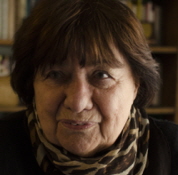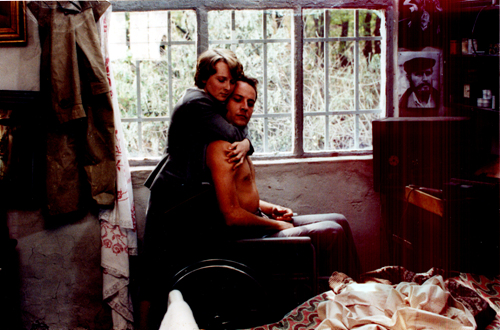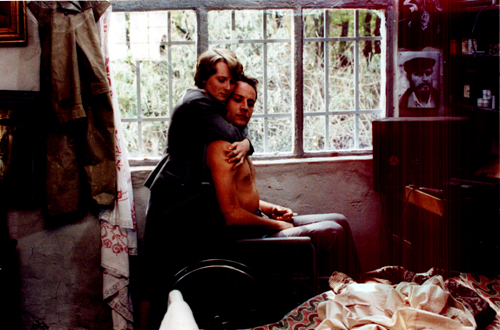9th(2007)
Diary for My Loves
Márta Mészáros
- Hungary
- 1987
- 143min
- 35mm
- color
SYNOPSIS
Mészáros\' second \"Diary\" film gives a story about Juli in her 20s. Juli decides to become a filmmaker but is mocked for the fact that she is a woman in an entrance interview for the film department at a university. The enforcement of Stalinism in response to the liberalization movement in Eastern Europe starts to tighten individual\'s lives. It is difficult for Juli to get out from the constraint of her stepmother Magda, a high-ranking bureaucrat of the Communist party. Janos who is like a father to Juli is forced to cooperate with Magda in a political purge against the opposition.. At last thanks to her own ingenuity she enters the Moscow school of film. For her first project, she makes a film about Hungarian realities but is expatriated from Hungary for political reasons. With Stalin\'s death, the liberalization movement gradually rises in Hungary and Juli plans to come back home from Moscow.
The staff and performers from the first \"Diary\" work got back together five years latter and made this second story that is not only about a young woman dreaming of a new cinema against a rigid social system and sexism but also of people at a fork in the road of political and moral choices in Eastern Europe around the 1950s before and after Stalin\'s death. A young woman\'s pure passion and voyage of love spread out in the age when moral trust entirely vacillates through the unique style of putting Juli as a fictional character in documentary footage. (NAM In-young)
The staff and performers from the first \"Diary\" work got back together five years latter and made this second story that is not only about a young woman dreaming of a new cinema against a rigid social system and sexism but also of people at a fork in the road of political and moral choices in Eastern Europe around the 1950s before and after Stalin\'s death. A young woman\'s pure passion and voyage of love spread out in the age when moral trust entirely vacillates through the unique style of putting Juli as a fictional character in documentary footage. (NAM In-young)
PROGRAM NOTE
Mészáros\' second \"Diary\" film gives a story about Juli in her 20s. Juli decides to become a filmmaker but is mocked for the fact that she is a woman in an entrance interview for the film department at a university. The enforcement of Stalinism in response to the liberalization movement in Eastern Europe starts to tighten individual\'s lives. It is difficult for Juli to get out from the constraint of her stepmother Magda, a high-ranking bureaucrat of the Communist party. Janos who is like a father to Juli is forced to cooperate with Magda in a political purge against the opposition.. At last thanks to her own ingenuity she enters the Moscow school of film. For her first project, she makes a film about Hungarian realities but is expatriated from Hungary for political reasons. With Stalin\'s death, the liberalization movement gradually rises in Hungary and Juli plans to come back home from Moscow.
The staff and performers from the first \"Diary\" work got back together five years latter and made this second story that is not only about a young woman dreaming of a new cinema against a rigid social system and sexism but also of people at a fork in the road of political and moral choices in Eastern Europe around the 1950s before and after Stalin\'s death. A young woman\'s pure passion and voyage of love spread out in the age when moral trust entirely vacillates through the unique style of putting Juli as a fictional character in documentary footage. (NAM In-young)
The staff and performers from the first \"Diary\" work got back together five years latter and made this second story that is not only about a young woman dreaming of a new cinema against a rigid social system and sexism but also of people at a fork in the road of political and moral choices in Eastern Europe around the 1950s before and after Stalin\'s death. A young woman\'s pure passion and voyage of love spread out in the age when moral trust entirely vacillates through the unique style of putting Juli as a fictional character in documentary footage. (NAM In-young)
Director
-

Márta MészárosMárta Mészáros
Between 1935 and 1946, Márta MÉSZÁROS lived in the Soviet Union. Her father, László MESZAROS, a sculptor who emigrated there, fell victim to Stalin’s cleansing. After graduating from the Union State Film School in Moscow in 1956, she made documentary films in the Bucharest AlexandruSahia Studio until 1958, and then worked for the Hungarian Film Production Company until 1968 as a short-film director. She has been making feature films since 1968. Her Diary-series are autobiographically inspired. Since 1992 she has been the managing director of the Nagy Imre Association.
Credit
- ProducerFerenc Szohár
- Cast Zsuzsa Czinkóczi, Jan Nowicki, Anna Polony
- Screenwriter Márta Mészáros, Éva Pataki
- Cinematography Nyika Jancsó
- Editor Éva Kármentő
- Music Zsolt Döme
- Sound Róbert Juhász



